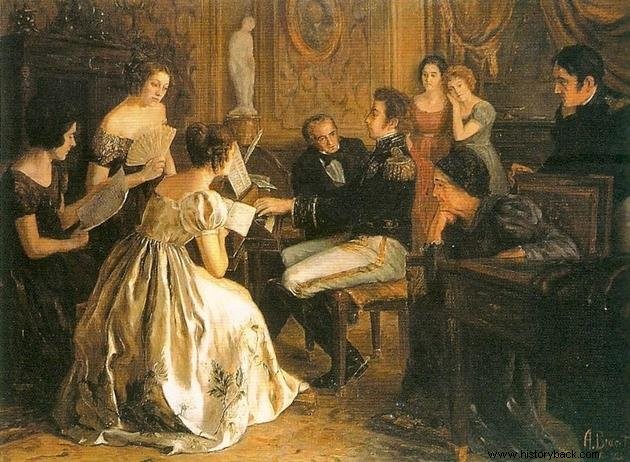The Brazilian Independence Anthem was written by journalist and politician Evaristo da Veiga (1799-1837) in August 1822.
His poetry initially received the title of "Brazilian Constitutional Anthem", being set to music by maestro Marcos Antônio da Fonseca Portugal (1760-1830).
Independence Hymn Lyrics
You can now, children of the Fatherland,
To see the kind mother happy;
Freedom has already dawned
On the horizon of Brazil.
Brave Brazilian people!
Far go... servile fear:
Or stay the free homeland
Or die for Brazil.
The shackles that forged us
From the cunning trickery...
There was a more powerful hand:
Brazil mocked them.
Brave Brazilian people!
Far go... servile fear:
Or stay the free homeland
Or die for Brazil.
Do not fear impious phalanxes,
Who have a hostile face;
Your breasts, your arms
They are walls of Brazil.
Brave Brazilian people!
Far go... servile fear:
Or stay the free homeland
Or die for Brazil.
Congratulations, oh Brazilian,
Now, with youthful grace,
Of the universe between the nations
Brazil's shines.
Brave Brazilian people!
Far go... servile fear:
Or stay the free homeland
Or die for Brazil.
Independence Anthem Video
Brazilian Independence AnthemSee also:
Independence of Brazil
Causes of Brazil's Independence
History of the Anthem of Independence
Emperor D. Pedro I (1798-1834) had musical training and was a student of the masters Father José Maurício Nunes Garcia (1767-1830), Marcos Portugal and Sigismund Neukomm (1778-1858).
He played the clarinet, bassoon and cello. He performed an overture, performed at the Italian Theater in Paris in 1832, as well as religious works such as a Credo and a Te Deum.
He composed the Anthem of the Letter , later adopted as the Portuguese National Anthem until 1910, when there was a coup that deposed the monarchy in Portugal.

In 1824, he set the poem by Evaristo da Veiga to music, replacing the old melody of Marcos Portugal and officially creating the Anthem of Independence of Brazil.
With the Proclamation of the Republic (1889) the anthem stopped being played in the country. In 1922, with the centenary of Independence, it was played again, but with the original music by maestro Marcos Portugal.
It was only during the presidency of Getúlio Vargas (1930-1945) that education minister Gustavo Capanema appointed a commission, which included conductor Heitor Villa-Lobos, to definitively restore the melody composed by D. Pedro I.
